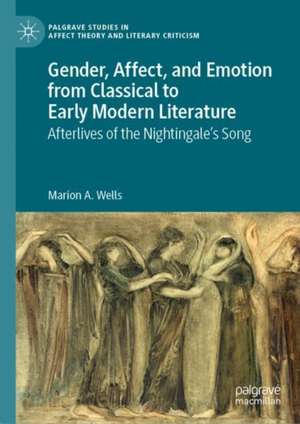Gender, Affect, and Emotion from Classical to Early Modern Literature: Afterlives of the Nightingale’s Song: Palgrave Studies in Affect Theory and Literary Criticism
Autor Marion A. Wellsen Limba Engleză Hardback – 25 ian 2024
Preț: 701.06 lei
Preț vechi: 824.79 lei
-15% Nou
Puncte Express: 1052
Preț estimativ în valută:
134.16€ • 139.27$ • 111.87£
134.16€ • 139.27$ • 111.87£
Carte tipărită la comandă
Livrare economică 24 martie-07 aprilie
Preluare comenzi: 021 569.72.76
Specificații
ISBN-13: 9783031277207
ISBN-10: 3031277201
Pagini: 309
Ilustrații: XI, 309 p. 1 illus.
Dimensiuni: 148 x 210 mm
Greutate: 0.54 kg
Ediția:1st ed. 2023
Editura: Springer International Publishing
Colecția Palgrave Macmillan
Seria Palgrave Studies in Affect Theory and Literary Criticism
Locul publicării:Cham, Switzerland
ISBN-10: 3031277201
Pagini: 309
Ilustrații: XI, 309 p. 1 illus.
Dimensiuni: 148 x 210 mm
Greutate: 0.54 kg
Ediția:1st ed. 2023
Editura: Springer International Publishing
Colecția Palgrave Macmillan
Seria Palgrave Studies in Affect Theory and Literary Criticism
Locul publicării:Cham, Switzerland
Cuprins
Chapter 1: From Passive Matter to Embodied Affects: Gendering Emotion in the Classical Tradition.-Chapter 2 :Towards an Early Modern Affect Theory: Christian Stoicism and the Augustinian Will in Medieval and Early Modern Thought.- Chapter 3: The Nightingale’s Song: Affective Crisis and the Feminine Cry in Virgil’s Aeneid and Ovid’s Metamorphoses.- Chapter 4: “In Her Swough”: Thwarted Affect and the Maternal Body in Petrarch, Chaucer, and Christine de Pisan .- Chapter 5: The Return of the Shrew: Sibylline Rage in Shakespeare’s The Winter’s Tale.- Chapter 6: The Tears of Rachel: Lament and Affective Improvisation in Mary Carey’s Spiritual Dialogue, Meditations, and Poems.
Notă biografică
Marion A. Wells is Henry N. Hudson Professor of English at Middlebury College, USA. Her previous publications include The Secret Wound: Love Melancholy and Early Modern Romance (Stanford UP, 2007).
Textul de pe ultima copertă
Drawing both on historical accounts of the emotions and on contemporary affect theory, this book explores the intersection of social constructions of sex and gender with the development of norms for emotive speech in literary texts from the classical to the early modern periods. More specifically, the book argues that the influential Stoic theory of the prepassions (as distinct from the passions proper) resonates richly with recent work on affect, emphasizing in similar ways the role of embodied feelings that may exceed available linguistic norms as well as challenging gendered emotion scripts. From the tragic Stoicism of Virgil’s Aeneid to Chaucer’s Stoic-Petrarchan Griselda and the Stoic-inflected attitudes reflected in the work of seventeenth century poet Mary Carey, the Stoic view of the emotions as test-cases for a moralized conception of masculine coherence conflicts with a fluid affective model of feeling that challenges the ideal of emotional self-containment.
Marion A. Wells is Henry N. Hudson Professor of English at Middlebury College, USA. Her previous publications include The Secret Wound: Love Melancholy and Early Modern Romance (Stanford UP, 2007).
Caracteristici
Integrates affect theory into historicized study of the emotions in classical, medieval, and early modern literary texts Explores the historical (and ongoing) impact of gender on the development of norms for emotive speech Develops a theory of affective injustice












